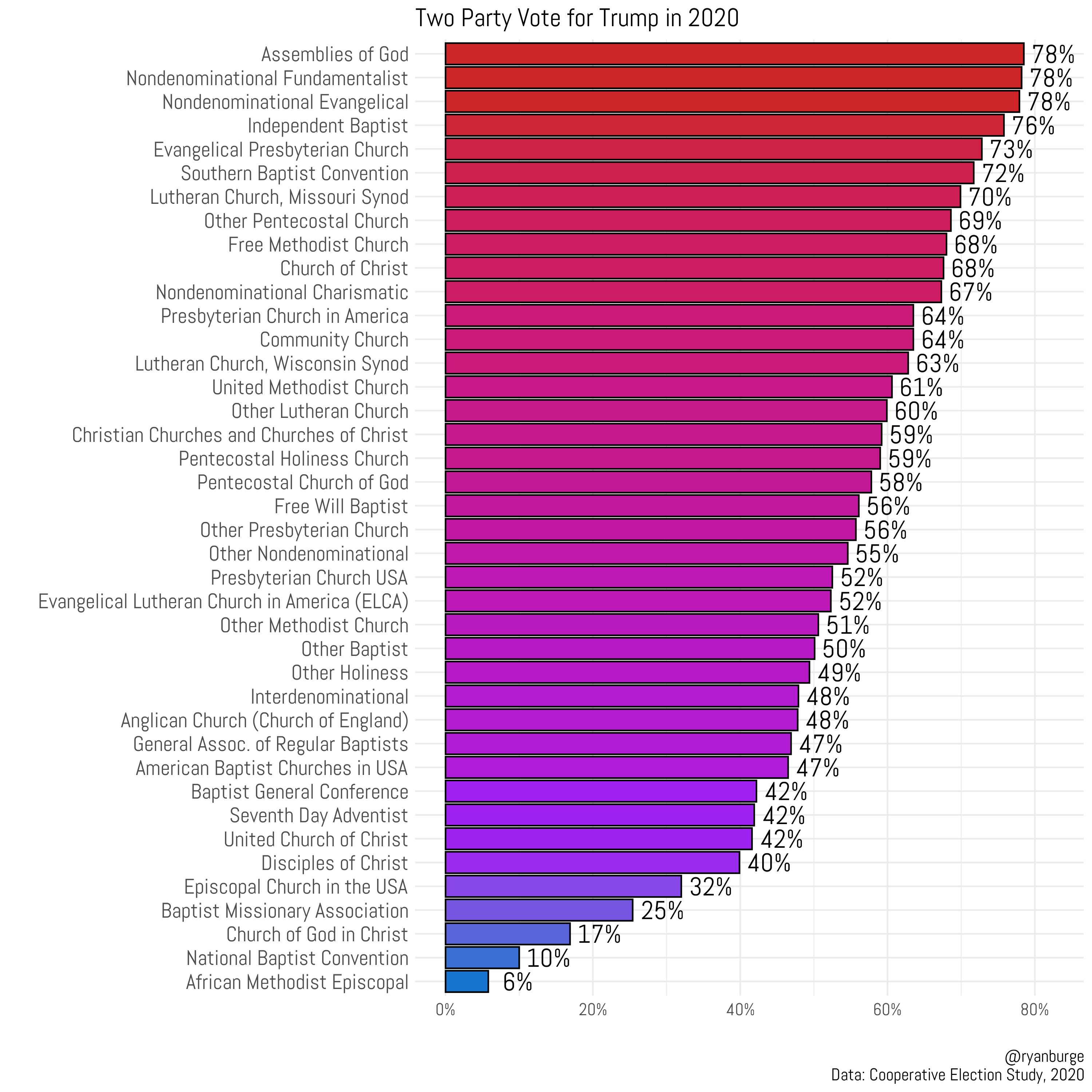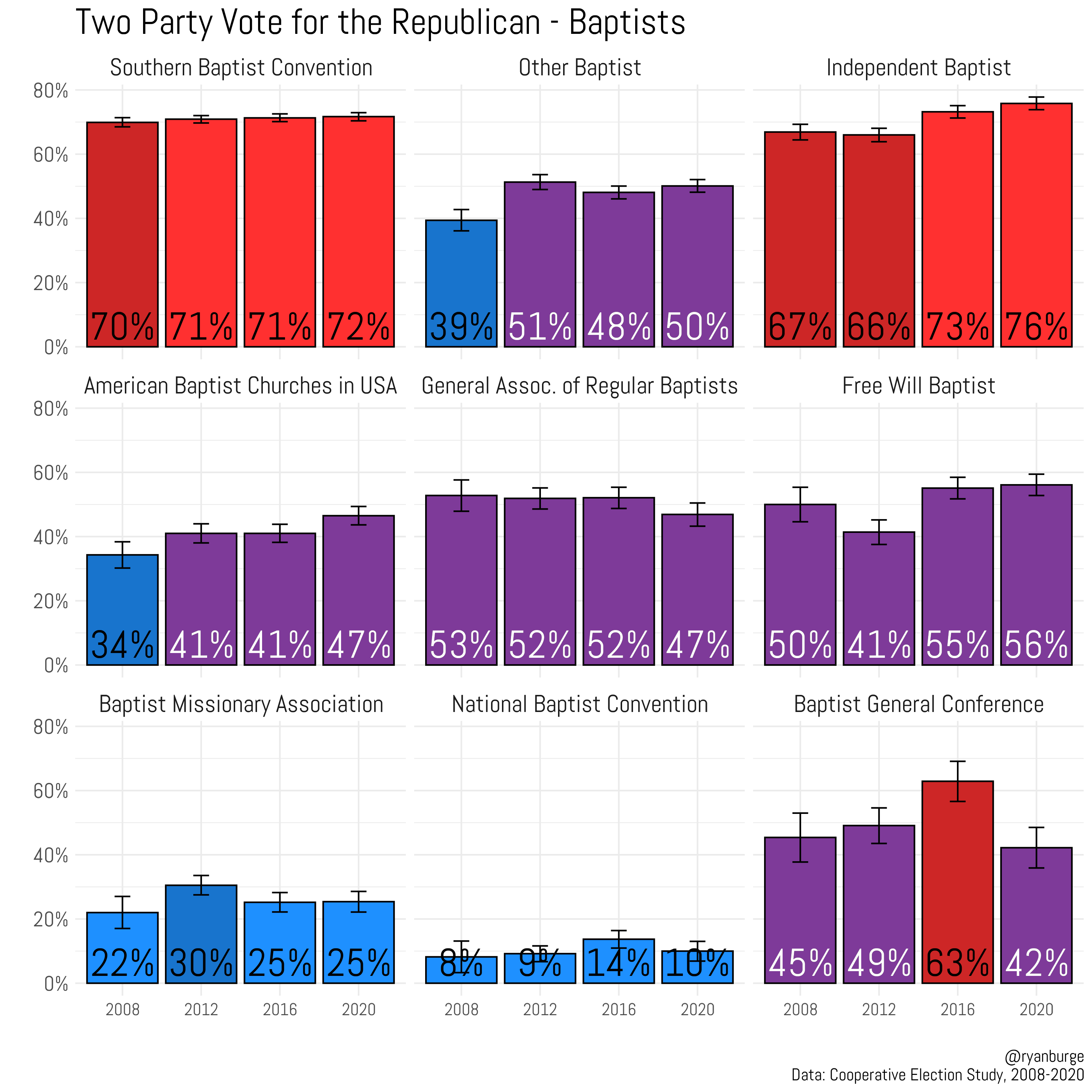Southern Baptists have voted consistently Republican in the last four presidential elections, researcher Ryan Burge says.
In his analysis of 40 U.S. denominations, “the Southern Baptists and the independent Baptists are clearly the most Republican of the bunch,” he reported in a recent “Graphs About Religion” post. “I am struck by how incredibly consistent the SBC numbers are, specifically. It’s been rock steady in the low seventies in the last four elections. I see no reason to anticipate a big shift in that percentage in 2024.”
But other Baptist groups are not like Southern Baptists, he added. American Baptists, the General Association of Regular Baptists and Free Will Baptists are among those less Republican. And two Black Baptist groups — the Baptist Missionary Association and the National Baptist Convention — are decidedly not Republican voters.
The Cooperative Baptist Fellowship and the Alliance of Baptists are too small to be included in the data Burge reviewed from the Cooperative Election Study.
The four election cycles covered in Burge’s analysis are Obama vs. McCain (2008), Obama vs. Romney (2012), Clinton vs. Trump (2016), and Biden vs. Trump (2020).

While “evangelical Christians” however defined have been labeled as most loyal to the current Republican Party and to Donald Trump, there actually is a lot of variation in voting preferences of Protestant Christians, he explains. “The denominations that are most heavily Republican come largely from a handful of families: Pentecostal, nondenominational, and Baptist.”
Both Black denominations and some Mainline denominations lean more toward the Democratic column, he documents. That includes the Baptist Missionary Association, the Church of God in Christ, the National Baptist Convention and the African Methodist Episcopal Church. Close behind are Episcopalians, United Church of Christ, and Christian Church (Disciples of Christ).

Burge breaks down his graphs by denominational family groups.
That data show a rightward shift in the voting patterns of United Methodists. “They were 55% for McCain in 2008 and that has just slowly crept up. In both 2016 and 2020, about 61% of United Methodists were Trump supporters. Of course, with the Methodist schism occurring in the last couple of years, I would fully expect the UMC voting bloc would become less red in the 2024 contest.”
Within the Methodist tradition, African Methodist Episcopalians are “the most unified denomination in this entire data exercise,” he notes. “It’s fair to say that they aren’t huge fans of the GOP.”
People who identify as nondenominational — a broad and vaguely defined category — make up the second largest group after Baptists. About 8% of Americans say they are nondenominational, compared to 11% who say they are Baptists and 5% who said they are Methodists.
Among nondenoms, “there’s no blue to be found in this graph,” Burge says. “Nondenominational evangelicals are nearly 80% for the Republicans in the last four elections and the nondenominational fundamentalists are slightly above that.”
His analysis also shows stark differences between the nation’s two largest Lutheran groups, the Evangelical Lutheran Church in America and the Lutheran Church Missouri Synod.
“The ELCA is an incredibly politically diverse denomination,” Burge says. “In three of the last four elections, the denomination has been statistically split on their vote choice. The LCMS is not so politically diverse. About 70% of those folks vote for Republicans.”
The two largest Presbyterian denominations — the Presbyterian Church (USA) and the Presbyterian Church in America — mirror the Lutheran split.
“The largest Presbyterian denomination is the PC(USA) and they are also politically split like folks are in the ELCA,” Burge says. “In the last four elections, about 51% of PCUSA folks voted for the Republican. I don’t know how many more times I can write this but the idea that the ELCA or PCUSA are deeply liberal denominations is just factually inaccurate. That might be true in the pulpit, it is absolutely false at the pew level.
“Meanwhile the PCA, which was Tim Keller’s denomination, is pretty right-leaning. About two-thirds of those folks cast a ballot for the GOP in a presidential election. There’s just one deep red denomination in this bunch — the Evangelical Presbyterian Church. But keep in mind that they are small — just a total sample of 422.”
As far as broad trends, Burge highlights three ideas and a prediction:
- How little variation there is from year to year. “Yes, there are a couple of examples of a denomination shifting five points (in either direction) from one election to another. But that’s often the really small denominations and the change is inside the margin of error. The SBC has not shifted in a meaningful way between 2008 and 2020. The same is true for the Assemblies of God and a lot of nondenominational folks.”
- Race tells a big part of the story. “The traditions that are heavily white like the aforementioned SBC and nondenominationals are deeply red traditions. Groups that form the Black church like the Baptist Missionary Association and COGIC are almost entirely blue on election day.”
- The largest traditions are Republican leaning.
“My blanket prediction in 2024 is simply this: Expect more of the same,” he concludes. “Republican-leaning denominations will vote for Trump in large numbers. Whether it looks more like the 2020 figures or the 2016 results will tell the story of who will win the White House for the next four years.”
Read more and subscribe to “Graphs About Religion” here.


